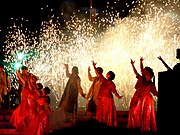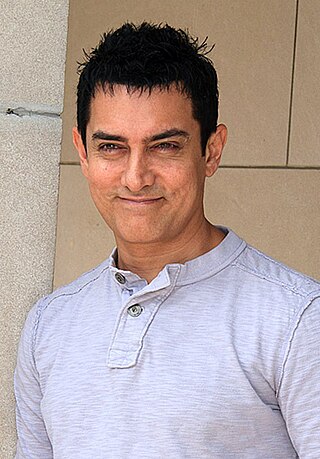Portal:Hindi cinema
The Hindi cinema portal

Hindi cinema, popularly known as Bollywood and formerly as Bombay cinema, refers to the film industry based in Mumbai, engaged in production of motion pictures in Hindi language. The popular term Bollywood is a portmanteau of "Bombay" (former name of Mumbai) and "Hollywood". The industry is a part of the larger Indian cinema, which also includes South Indian cinema and other smaller film industries.
In 2017, Indian cinema produced 1,986 feature films, of which the largest number, 364 have been in Hindi. , Hindi cinema represented 43 percent of Indian net box-office revenue; Tamil and Telugu cinema represented 36 percent, and the remaining regional cinema constituted 21 percent. Hindi cinema is one of the largest centres for film production in the world. Hindi films sold an estimated 341 million tickets in India in 2019. Earlier Hindi films tended to use vernacular Hindustani, mutually intelligible by speakers of either Hindi or Urdu, while modern Hindi productions increasingly incorporate elements of Hinglish.
The most popular commercial genre in Hindi cinema since the 1970s has been the masala film, which freely mixes different genres including action, comedy, romance, drama and melodrama along with musical numbers. Masala films generally fall under the musical film genre, of which Indian cinema has been the largest producer since the 1960s when it exceeded the American film industry's total musical output after musical films declined in the West. Dadasaheb Phalke's silent film Raja Harishchandra (1913) is the first feature length film made in India. The first Indian musical talkie was Alam Ara (1931), four years after the first Hollywood sound film The Jazz Singer (1927).
Alongside commercial masala films, a distinctive genre of art films known as parallel cinema has also existed, presenting realistic content and avoidance of musical numbers. In more recent years, the distinction between commercial masala and parallel cinema has been gradually blurring, with an increasing number of mainstream films adopting the conventions which were once strictly associated with parallel cinema. (Full article...)
Selected article
Lage Raho Munna Bhai is a 2006 Indian comedy film directed by Rajkumar Hirani and produced by Vidhu Vinod Chopra. It is the second film in the popular Munna Bhai series of Bollywood. Sanjay Dutt stars in this film as Munna Bhai, a Mumbai-based underworld don, who begins to see the spirit of Mahatma Gandhi. Through his interactions with the image of Gandhi, Munna Bhai begins to practice what he calls Gandhigiri to help ordinary people solve their problems. His sidekick, Circuit, is portrayed by Arshad Warsi. The film has had a strong cultural impact in India, popularising Gandhism under Munna Bhai's notion of Gandhigiri. The film was generally well-received by both critics and the mass audience. It was a box office success and was elevated to a "blockbuster" rating on Box Office India after grossing over Rs. 720 million. It is the recipient of a number of awards, including four National Film Awards. Lage Raho Munna Bhai is the first Hindi film to be shown at the United Nations, and also played to a packed house of mostly French students who "clapped till the credits were finished" during the Tous Les Cinema du Monde section of the 2007 Cannes Film Festival.
Did you know...
- ... that the film English Vinglish marks the comeback of actress Sridevi (pictured) after a 14-year sabbatical?
- ... that Vyjayanthimala, who played Chandramukhi in the 1955 film Devdas, declined the Filmfare Award for Best Supporting Actress because she thought that her role was not a supporting one?
- ... that Master Vithal, the hero of India's first talkie Alam Ara and many silent stunt films, was known as the "Douglas Fairbanks of India"?
Subcategories
Selected biography
Selected image
WikiProjects
Recognised content
Topics
Awards: Bollywood Movie Awards (defunct) • Filmfare Awards • Global Indian Film Awards (defunct) • International Indian Film Academy Awards • National Film Awards • Screen Awards • Star Guild Awards • Stardust Awards • Zee Cine Awards
Institutions Asian Academy of Film & Television • Central Board of Film Certification • Directorate of Film Festivals • Film and Television Institute of India • Film City • Fox Star Studios • National Film Development Corporation of India • Satyajit Ray Film and Television Institute
Lists: List of Bollywood films • Film clans • Highest-grossing films in overseas markets • Highest-grossing films
Things you can do
- Add
{{portal|Hindi cinema}}to the See also section of Bollywood film-related articles. - Tag the talk pages of Bollywood film related articles with the {{WikiProject Film|Indian-task-force=yes}} banner.
- Collaborate with other participants at Wikipedia:WikiProject Film/Indian cinema task force.
- Cleanup: A cleanup listing for this project is available.
- Rate the Unassessed Bollywood articles in the Indian cinema task force.
- Cleanup needed
- Bot-generated cleanup listing • Hindi films and plagiarism • Ramoji Film City • IIFA Awards • IIFA • Anand Bakshi • Ajay Devgan • N. T. Rama Rao Jr.
- Requested articles
- List of missing Indian Films (see also lists of Indian films for redlinks) • Beary Cinema
- Expansion needed
- Draft articles: Tulu cinema • Anahat (film) • Prakash Jha • Central Board of Film Certification • Filmfare Awards South • Kerala Film Critics Association Awards • Amitabh Bachchan • Gabbar Singh • Sanjay Dutt • Hindustan Photo Films • Sanskrit cinema
- Citations needed
- Central Board of Film Certification
Related portals
Associated Wikimedia
The following Wikimedia Foundation sister projects provide more on this subject:
-
Commons
Free media repository -
Wikibooks
Free textbooks and manuals -
Wikidata
Free knowledge base -
Wikinews
Free-content news -
Wikiquote
Collection of quotations -
Wikisource
Free-content library -
Wikiversity
Free learning tools -
Wiktionary
Dictionary and thesaurus

























